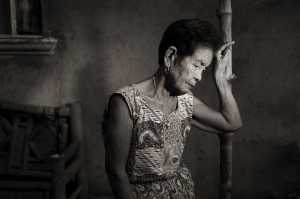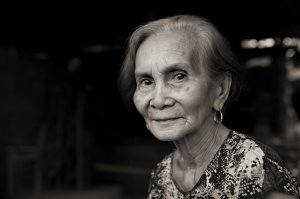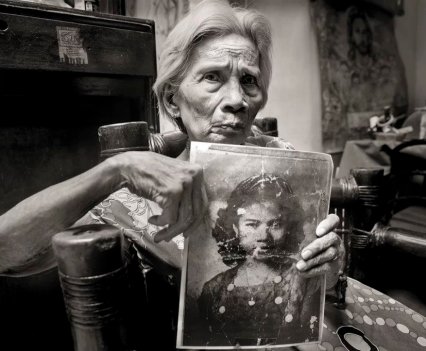
Lola Fedencia Nacar David, 91, had this photo taken when she was 15 years old as part of her application to work as a maid. “They would hit me in the head and I would lose consciousness,” said Lola Fedencia Nacar David, who was 14 years old in 1942 when she was taken as a sex slave. David sold fruit and vegetables in the open market in Pangasinan, Philippines, during World War II. A Japanese soldier sliced her ear and threatened to behead her if she did not go to the garrison with him. There, for 10 days, she washed clothes and cooked in the day time — and by night she was beaten and raped by 5-10 soldiers of the Japanese Imperial Army. “I lost my mind,” she said. Her own grandmother and sister were also held as “comfort women.” She watched her grandmother raped and shot in front of her. David eventually married and had eight children. “I love you and you were still a child when that happened,” her husband said when she revealed her painful past. She never told her children, and to the world, she lived in shame for most of her life. It was not until the 90s, when Filipina beauty queen Nelia Sancho traveled to Korea and witnessed Korean “comfort women” openly fighting for redress and returned home with a new mission, did David and several hundred other Filipina “comfort women” come forward. Today, when she recalls her time as a “comfort woman,” “It still hurts. I was innocent, why did that happen to me? I knew nothing of the world. And I never got an education [because of it].” David’s husband worked, she said, but he was a drunk, a gambler and a womanizer. So David picked through garbage to feed her children when they were young. These days, she lives a solitary life with some of her adult children in Antipolo, Metro Manila. She has 38 grandchildren and 25 great grandchildren. She has passports packed with visas from years of travel seeking justice from the Japanese government for herself and her fellow comfort women. David said she has received some compensation from the Asian Women’s Fund, a fund supported by private Japanese donors, but she still wants the Japanese government to acknowledge the suffering she and other Filipina “comfort women” endured. Of an estimated 1,000 “comfort women” in the Philippines, only about 40 remain alive; she attributes her longevity to leaving the past in the past. Photo taken on Friday, May 10, 2019. Photo by Cheryl Diaz Meyer
Throughout Asia in Japanese occupied territories, some 200,000 girls and women — 80 percent were between the ages of 14 and 18, and some as young as eight — were sexually enslaved and victimized through abduction, coercion or deception by the Japanese Imperial Army during World War II. An estimated 1,000 girls and women served as “comfort women” in the Philippines. Three-fourths of the women were killed or died of injuries, illness and experimentation. Survivors suffered from post traumatic stress disorder, psychological ailments and sexually transmitted diseases. After the war, few women continued their education and consequently lived lives of economic disadvantage. Most eventually married but were commonly subjected to abuse from their husbands and often lived as societal outcasts.
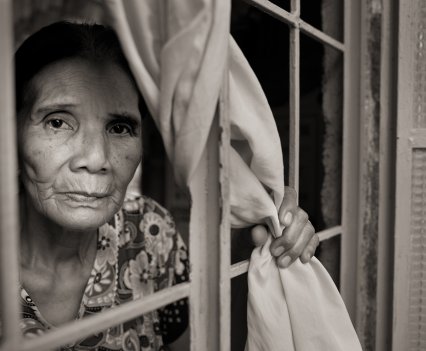
Lola Perla Bulaon Balingit, age 89, said she still has flashbacks of the atrocities she suffered at the hands of Japanese soldiers and wonders, “How were they able to do that to another human as a human being?” Balingit is one of the last living Comfort Women of the Philippines, in Barangay Mapaniqui in Pampanga, Philippines, on Saturday, May 18, 2019. On November 23, 1944, Mapaniqui was bombarded and raided by the Japanese Imperial Army during World War II as they searched the area for guerrillas. All the men were captured, their genitals severed and stuffed in their mouths, executed by machine gun and their corpses burned in the school yard. The girls and women were marched to the Red House carrying the loot that the Japanese soldiers stole from their homes. The once regal mansion owned by a Filipino doctor was used as a garrison and “comfort station.” For the duration of the night, the girls and women, some as young as eight, were raped repeatedly by the Japanese Imperial Army. Balingit was 13 years old at the time of the assaults. Balingit said she never continued her schooling after the war and her father was too fearful to allow her to move away for work. She has stayed in Mapaniqui all her life and today, suffers from vertigo and deteriorating health. “Even if I say I have forgiven, but in my heart there is still a tinge of pain,” she said gently. Photo by Cheryl Diaz Meyer
Throughout Asia in Japanese occupied territories, some 200,000 girls and women — 80 percent were between the ages of 14 and 18, and some as young as eight — were sexually enslaved and victimized through abduction, coercion or deception by the Japanese Imperial Army during World War II. An estimated 1,000 girls and women served as “comfort women” in the Philippines. Three-fourths of the women were killed or died of injuries, illness and experimentation. Survivors suffered from post traumatic stress disorder, psychological ailments and sexually transmitted diseases. After the war, few women continued their education and consequently lived lives of economic disadvantage. Most eventually married but were commonly subjected to abuse from their husbands and often lived as societal outcasts.
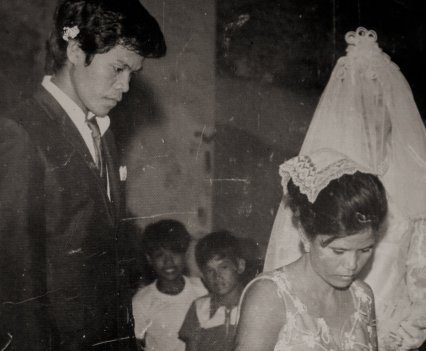
“I didn’t want to get married initially, because of what happened at the Red House,” said Lola Cefirina Lapuz Turla, “and then I married my childhood friend, a neighbor. I promised to make him wait for 10 years, but then it was eight years…because he was insistent, and because I also liked him. My parents also liked him. When he came to visit us, he would stay until morning. And when the other suitors would arrive, once they were inside the house, he would put tires on the stairs. Wouldn’t that cause a brawl?” she said giggling. Turla wed Fermin Turla in 1959 and would bear five children. Turla was 12 years old when her village of Mapaniqui in Pampanga, Philippines, was bombarded and raider by the Japanese Imperial Army during World War II. All the men were captured, their sexual organs severed and stuffed in their mouths, executed by machine gun, and their corpses burned in the school yard. The girls and women, including Turla and her mother, were marched to the Red House, forced to carry the loot that the Japanese had stolen from their homes. The once regal mansion owned by a Filipino doctor was used as a garrison and “comfort station” where more than 100 girls and women were raped all night by the Japanese Imperial Army. Photo taken on Friday, May 17, 2019. Photo by Cheryl Diaz Meyer
Throughout Asia in Japanese occupied territories, some 200,000 girls and women — 80 percent were between the ages of 14 and 18, and some as young as eight — were sexually enslaved and victimized through abduction, coercion or deception by the Japanese Imperial Army during World War II. An estimated 1,000 girls and women served as “comfort women” in the Philippines. Three-fourths of the women were killed or died of injuries, illness and experimentation. Survivors suffered from post traumatic stress disorder, psychological ailments and sexually transmitted diseases. After the war, few women continued their education and consequently lived lives of economic disadvantage. Most event
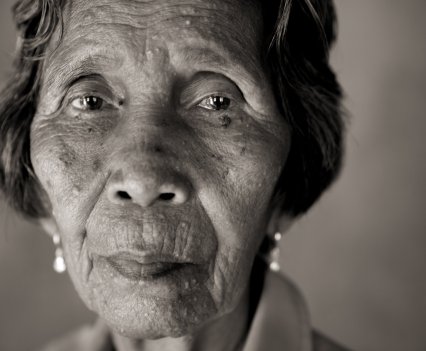
Lola Lydia Alonzo Sanchez, 89, is one of the last living “comfort women” of the Philippines, in the village Mapaniqui in Pampanga, Philippines, on Saturday, May 18, 2019. On November 23, 1944, Mapaniqui was bombarded and raided by the Japanese Imperial Army during World War II as they searched the area for guerrillas. All the men were captured, their genitals severed and stuffed in their mouths, executed by machine gun and their corpses burned in the school yard. The girls and women were marched to the Red House carrying the loot that the Japanese soldiers stole from their homes. The once regal mansion owned by a Filipino doctor was used as a garrison and “comfort station.” For the duration of the night, the girls and women, some as young as eight, were raped repeatedly by the Japanese Imperial Army. Sanchez was 14 years old at the time of the assaults. “After the incident, I developed an infection and the doctor told me I’d never have children. I did the Sayao sa Obando (fertility dance), and when I married, we had 15 children one after the other. Some said that, in the entire Pampanga, I have the most children — perhaps, not even in Pampanga,” she said laughing. “I told them, there’s nothing wrong with that as they all come from my only husband. It would be wrong if I had done shameful things, but I didn’t. My acts were all clean. My husband also preferred to have a big family.” Photo by Cheryl Diaz Meyer
Throughout Asia in Japanese occupied territories, some 200,000 girls and women — 80 percent were between the ages of 14 and 18, and some as young as eight — were sexually enslaved and victimized through abduction, coercion or deception by the Japanese Imperial Army during World War II. An estimated 1,000 girls and women served as “comfort women” in the Philippines. Three-fourths of the women were killed or died of injuries, illness and experimentation. Survivors suffered from post traumatic stress disorder, psychological ailments and sexually transmitted dise
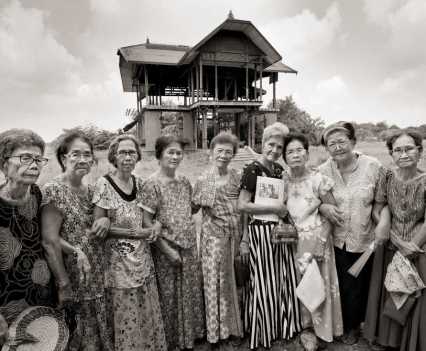
The Malaya Lolas are a group of women who were repeatedly sexually assaulted as children by the Japanese Imperial Army soldiers during a raid on their village of Mapaniqui in Pampanga during World War II. On November 23, 1944, Mapaniqui was bombarded and raided by the Japanese searching for guerrillas. All the men were captured, their genitals severed and stuffed in their mouths, executed by machine gun and their corpses burned in the school yard. The girls and women were marched to the Red House carrying the loot that the Japanese soldiers stole from their homes. The once regal mansion owned by a Filipino doctor was used as a garrison and “comfort station” where the women and girls, some as young as eight, were raped all night by the Japanese Imperial Army. Left to right are Lolas Belen Alarcon Culala, Catalina Yarbut Manio, Lydia Alonzo Sanchez, Francia Aga Buco, Pilar Quilantang Galang, Isabelita Vinuya, Maria Lalu Quilantang, Candelaria Soliman and Emilia dela Cruz Mangilit. Photo taken on Sunday, May 19, 2019. Photo by Cheryl Diaz Meyer
Throughout Asia in Japanese occupied territories, some 200,000 girls and women — 80 percent were between the ages of 14 and 18, and some as young as eight — were sexually enslaved and victimized through abduction, coercion or deception by the Japanese Imperial Army during World War II. An estimated 1,000 girls and women served as “comfort women” in the Philippines. Three-fourths of the women were killed or died of injuries, illness and experimentation. Survivors suffered from post traumatic stress disorder, psychological ailments and sexually transmitted diseases. After the war, few women continued their education and consequently lived lives of economic disadvantage. Most eventually married but were commonly subjected to abuse from their husbands and often lived as societal outcasts.
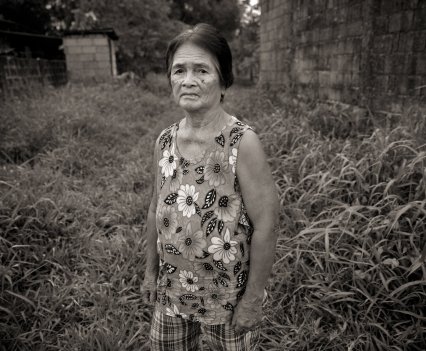
“We will not forget what happened until the day we die. It has been engraved in our hearts,” said Lola Francia Aga Buco, age 88, still seething with anger and bitterness. Buco is one of the last living “comfort women” of the Philippines, in the village of Mapaniqui in Pampanga, Philippines, on Saturday, May 18, 2019. On November 23, 1944, Buco and more than 100 other girls and women were marched to the Bahay Na Pula, also known as the Red House, and were systematically raped by the Japanese Imperial Army as they retreated from the country at the end of World War II. Buco was 14 years old at the time of the assaults. While most “comfort women” struggled to overcome depression and other mental and physical illness, few continued with their education and consequently were economically disadvantaged, Buco proudly described how she became a professional seamstress and was able to help support her family. She married her neighbor Abelardo Buco, 13 years her junior and together they built a decent life in the village, raising four children. Of their children learning of the events in 1944, “They kept their mouths shut because after all, I didn’t wish for it,” said Buco. Buco and her husband have spent years fighting for justice, and have never received compensation from the Japanese government. “The Malaya Lola victims have been dying without the appropriate response, to this day,” said her husband.
Photo by Cheryl Diaz Meyer
Throughout Asia in Japanese occupied territories, some 200,000 girls and women — 80 percent were between the ages of 14 and 18, and some as young as eight — were sexually enslaved and victimized through abduction, coercion or deception by the Japanese Imperial Army during World War II. An estimated 1,000 girls and women served as “comfort women” in the Philippines. Three-fourths of the women were killed or died of injuries, illness and experimentation. Survivors suffered from post traumatic stress disorder, psychological ailments and sexually tr
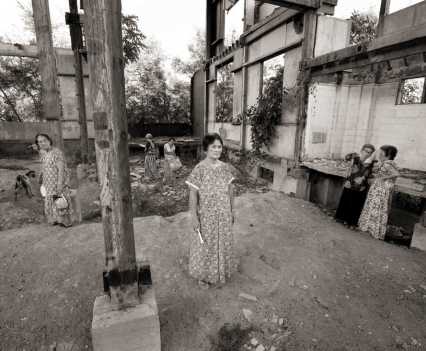
“We will not forget what happened until the day we die. It has been engraved in our hearts,” said Lola Francia Aga Buco, age 88, still seething with anger and bitterness. Buco is one of the last living “comfort women” of the Philippines, in the village of Mapaniqui in Pampanga, Philippines, on Sunday, May 19, 2019. On November 23, 1944, Buco and more than 100 other girls and women were marched to the Bahay Na Pula, also known as the Red House, and were systematically raped by the Japanese Imperial Army as they retreated from the country at the end of World War II. Buco was 14 years old at the time of the assaults. While most “comfort women” struggled to survive and few received much schooling, later being economically disadvantaged, Buco proudly described how she became a professional seamstress and was able to help support her family. She married her neighbor Abelardo Buco, 13 years her junior and together they built a decent life in the village, raising four children. Of their children learning of the events in 1944, “They kept their mouths shut because after all, I didn’t wish for it,” said Buco. Buco and her husband have spent years fighting for justice from the Japanese government, and have never received compensation or acknowledgement. “The Malaya Lola victims have been dying without the appropriate response, to this day,” said her husband. Photo by Cheryl Diaz Meyer
Throughout Asia in Japanese occupied territories, some 200,000 girls and women — 80 percent were between the ages of 14 and 18, and some as young as eight — were sexually enslaved and victimized through abduction, coercion or deception by the Japanese Imperial Army during World War II. An estimated 1,000 girls and women served as “comfort women” in the Philippines. Three-fourths of the women were killed or died of injuries, illness and experimentation. Survivors suffered from post traumatic stress disorder, psychological ailments and sexually transmitted diseases. After the war, few women cont
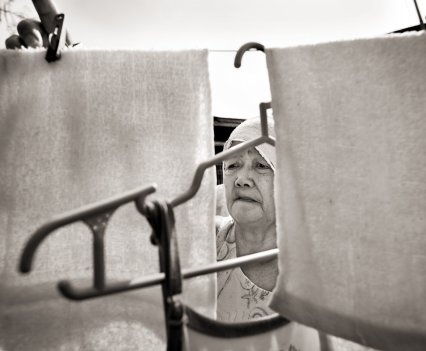
Despite her deteriorating health, Lola Candelaria Soliman, 87, manually washes clothes and hangs them in the sun in the village of Mapaniqui in Pampanga. Soliman was 12 years old when their village was attacked by the Japanese during World War II; all the men were rounded up, their genitals severed and stuffed in their mouths, then they were executed by machine gun and their corses were burned in the school yard. The girls and women were marched to the Red House carrying the loot that the Japanese soldiers stole from their homes. The once regal mansion owned by a Filipino doctor was used as a garrison and “comfort station” where the women and girls, some as young as eight, were raped all night by the Japanese soldiers — mothers and daughters locked in the same room screaming as they were assaulted within feet of each other. Photo taken on Sunday, May 19, 2019.
Throughout Asia in Japanese occupied territories, some 200,000 girls and women — 80 percent were between the ages of 14 and 18, and some as young as eight — were sexually enslaved and victimized through abduction, coercion or deception by the Japanese Imperial Army during World War II. An estimated 1,000 girls and women served as “comfort women” in the Philippines. Three-fourths of the women were killed or died of injuries, illness and experimentation. Survivors suffered from post traumatic stress disorder, psychological ailments and sexually transmitted diseases. After the war, few women continued their education and consequently lived lives of economic disadvantage. Most eventually married but were commonly subjected to abuse from their husbands and often lived as societal outcasts.
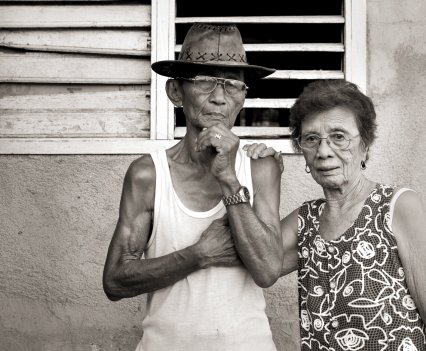
Lola Pilar Quilantang Galang and Oscar Galang both survived the raid on their village of Mapaniqui in Pampanga by the Japanese Imperial Army on November 23, 1944. On that day, Galang and more than 100 other girls and women, were marched to the Bahay Na Pula, also known as the Red House, and were systematically raped by the Japanese forces as they retreated from the country at the end of World War II. Oscar Galang, who was 7 years old and clinging with his seven siblings to his mother’s skirt, also remembers being at the Red House. “She was holding all of us,” Oscar said. “We hadn’t eaten so we were all crying. They must have taken pity on us, as they released my mother.” Pilar Quilantang Galang was 9 years old at the time of the assaults and even today can barely acknowledge the atrocities she endured. “They were just cuddling us, it wasn’t consummated, just caressing because we were too young,” Galang said. Yet, as she continued recounting her story, “My body bled then, and how could I have the strength? My body was a total wreck. I believe that was still rape. You can truly see that because there was blood coming from my…My body was destroyed. There was blood all over my clothes. They did it repeatedly. My body was ravaged before I was released.” Oskar and Pilar’s marriage was arranged by their parents. They eventually would have nine children together, and now have more than 40 grandchildren and great grandchildren. Through the years, Oscar Galang would remind his wife, “You are just a leftover of the Japanese.” “Why would I get mad?” asked Galang. “It really happened.” Photo taken on Sunday, May 19, 2019. Photo by Cheryl Diaz Meyer
Throughout Asia in Japanese occupied territories, some 200,000 girls and women — 80 percent were between the ages of 14 and 18, and some as young as eight — were sexually enslaved and victimized through abduction, coercion or deception by the Japanese Imperial Army during World War II. An estimated 1,000 girls and women served as
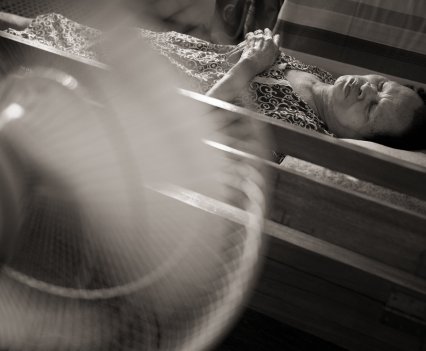
For the past 20 years, Lola Ester Manimbo Palacio, 84, has lived on the precipice of life and death after suffering multiple strokes that paralyzed parts of her body including her tongue. Manimbo was 9 years old on November 23, 1944, when her village of Mapaniqui in Pampanga, Philippines, was attacked by the Japanese searching for guerrillas. All the men were rounded up, their genitals cut off and stuffed in their mouths, then executed by machine gun. The women and girls were marched to the Red House carrying the loot that the Japanese soldiers stole from their homes. The once regal mansion owned by a Filipino doctor was used as a garrison and “comfort station” where the women and girls, some as young as eight, were raped all night by the Japanese Imperial Army. She is fortunate that her daughter married a seaman, and her children and grandchildren provide for her care. Photo taken on Monday, May 20, 2019. Photo by Cheryl Diaz Meyer
Throughout Asia in Japanese occupied territories, some 200,000 girls and women — 80 percent were between the ages of 14 and 18, and some as young as eight — were sexually enslaved and victimized through abduction, coercion or deception by the Japanese Imperial Army during World War II. An estimated 1,000 girls and women served as “comfort women” in the Philippines. Three-fourths of the women were killed or died of injuries, illness and experimentation. Survivors suffered from post traumatic stress disorder, psychological ailments and sexually transmitted diseases. After the war, few women continued their education and consequently lived lives of economic disadvantage. Most eventually married but were commonly subjected to abuse from their husbands and often lived as societal outcasts.
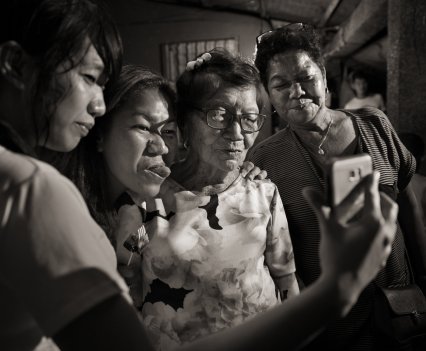
Lola Felicisima Albarece celebrates her 90th birthday with her family in Roxas City, Philippines, on May 26, 2019. Albarece was 13 years old during World War II when she and her mother were harvesting sweet potatoes on a farm. A few Japanese soldiers arrived and picked alongside them for a while, and when they finished, they abducted her, taking her with them to the garrison at Capiz Emmanuel Hospital. Albarece was locked in a room where for two months the Japanese Imperial Army soldiers took turns raping her and 10 other girls. When Albarece was released, she found her family, who cried at the sight of her, believing that she had been killed. Albarece’s father forbade her to speak about her experience, creating a cycle of shame. She married a kind man 10 years her senior, who never mentioned her past and helped her overcome her depression. They had 10 children, 50 grandchildren and 30 great great grandchildren. After fifty years of hiding her secret, Albarece came out in the 90s when other Filipinas were coming out publicly, and found, to her surprise and relief, that several of her neighbors had been through the same experience. The friendships they built helped them with healing the emotional scars. Despite years of seeking restitution from the Japanese government, she has received nothing. She lives on a senior citizen’s pension from the Philippine government of $10 per month. Fortunately she and her husband had built a humble home and her family gives what they can to help support her. Albarece said that in her old age, compensation would help her pay for doctor’s visits and medicine for her high blood pressure. Photo by Cheryl Diaz Meyer
Throughout Asia in Japanese occupied territories, some 200,000 girls and women — 80 percent were between the ages of 14 and 18, and some as young as eight — were sexually enslaved and victimized through abduction, coercion or deception by the Japanese Imperial Army during World War II. An estimated 1,000 girls and women ser

“I’m scared, this is not a good place,” said Lola Teresita Dayo, 88, who is visibly emotional as she visits the remains of the Belo Mansion where she was imprisoned and used as a “comfort woman” during World War II. Dayo was 12 years old when she was traveling with her family and were stopped by Japanese soldiers. One of them declared that she was pretty, and led her to their armored vehicle. Despite her protestations, she was taken from her parents and brought to the mansion in Roxas City, which was being used as a garrison by the Japanese Imperial Army soldiers. “Oh God, help me!” cried Dayo as soldiers took turns raping her until she was unconscious. Dayo, locked in a storage room with no windows, was given food and clean clothes daily, and was abused by multiple soldiers every night for a week until a Filipina mistress of one of the Japanese officers helped her escape. Throughout the Philippines, some 1,000 women and girls were kept as “comfort women” to satisfy the sexual appetites of Japanese soldiers. Three quarters of them perished, and today, around 40 remain alive, all in their late 80s and early 90s. Photo taken on May 27, 2019. Photo by Cheryl Diaz Meyer
Throughout Asia in Japanese occupied territories, some 200,000 girls and women — 80 percent were between the ages of 14 and 18, and some as young as eight — were sexually enslaved and victimized through abduction, coercion or deception by the Japanese Imperial Army during World War II. An estimated 1,000 girls and women served as “comfort women” in the Philippines. Three-fourths of the women were killed or died of injuries, illness and experimentation. Survivors suffered from post traumatic stress disorder, psychological ailments and sexually transmitted diseases. After the war, few women continued their education and consequently lived lives of economic disadvantage. Most eventually married but were commonly subjected to abuse from their husbands and often lived as societal outcasts.
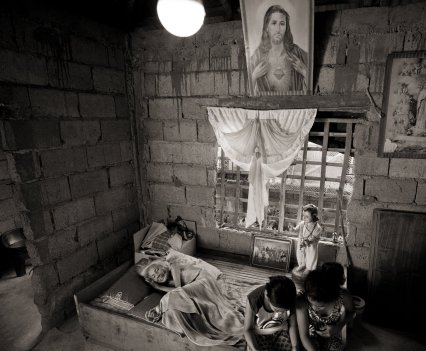
Lola Juliana dela Cruz, 92, weighing about 40 pounds, has been languishing for the past year in her home in Roxas City, Philippines, on May 27, 2019. Dela Cruz died on September 12, 2019. In her testimony taken in 1998, she said: “At the garrison, they imprisoned me in a room, where I could not get out. The cook was the only one who could give me food. The only other ones I saw were the three soldiers who came into my room every night and raped me three to five times a night in the course of one month.” Dela Cruz was about 17 years old when she was sexually enslaved by the Japanese Imperial Forces during World War II in Roxas City, Philippines. When she fought off the soldiers, they bayoneted her in the elbow, so she never learned to write due to her injury, according to her family. Dela Cruz would eventually marry and bear 15 children. [She received compensation of approximately $8,000 from the Asian Women’s Fund, a private fund set up by the Japanese government but funded by private donors and organizations, (still confirming this info-pls do not publish this part of the caption] and today lives on her Philippine pension of $10 per month.
Photo by Cheryl Diaz Meyer
Throughout Asia in Japanese occupied territories, some 200,000 girls and women — 80 percent were between the ages of 14 and 18, and some as young as eight — were sexually enslaved and victimized through abduction, coercion or deception by the Japanese Imperial Army during World War II. An estimated 1,000 girls and women served as “comfort women” in the Philippines. Three-fourths of the women were killed or died of injuries, illness and experimentation. Survivors suffered from post traumatic stress disorder, psychological ailments and sexually transmitted diseases. After the war, few women continued their education and consequently lived lives of economic disadvantage. Most eventually married but were commonly subjected to abuse from their husbands and often lived as societal outcasts.
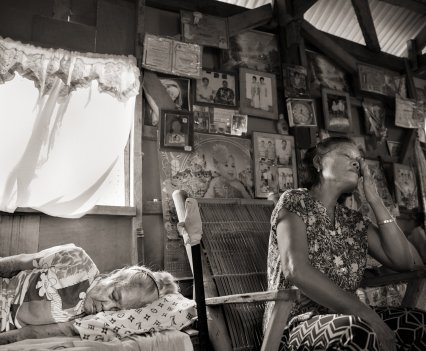
“There was nothing I could do. They were going to kill three of our relatives if I didn’t cooperate,” said Lola Estelita Jarce when she revealed to her children some 55 years later that she was a Comfort Woman during World War II. Jarce was 14 years old when she was sexually enslaved for a month in Roxas City, Philippines, by the Japanese Imperial Army soldiers. In her old age, she is frail and cared for by her daughter Rosemarie Jarce. When she was released, her parents and relatives felt such pity that they welcomed her back gratefully. She eventually married and had a family. According to Rosemarie, the family has accepted their mother’s horrific past, but what still hurts today is the gossip about her mother. Photo taken on May 28, 2019, on her 91st birthday. Photo by Cheryl Diaz Meyer
Throughout Asia in Japanese occupied territories, some 200,000 girls and women — 80 percent were between the ages of 14 and 18, and some as young as eight — were sexually enslaved and victimized through abduction, coercion or deception by the Japanese Imperial Army during World War II. An estimated 1,000 girls and women served as “comfort women” in the Philippines. Three-fourths of the women were killed or died of injuries, illness and experimentation. Survivors suffered from post traumatic stress disorder, psychological ailments and sexually transmitted diseases. After the war, few women continued their education and consequently lived lives of economic disadvantage. Most eventually married but were commonly subjected to abuse from their husbands and often lived as societal outcasts.

“I’m scared, this is not a good place,” said Lola Teresita Dayo, 88, in the remains of the Belo Mansion where she was imprisoned and used as a “comfort woman” during World War II. Dayo was 12 years old when she was traveling with her family and were stopped by Japanese soldiers. One of them declared that she was pretty, and led her to their armored vehicle. Despite her protestations, she was taken from her parents and brought to the mansion in Roxas City, which was being used as a garrison by the Japanese Imperial Army soldiers. “Oh God, help me!” cried Dayo as soldiers took turns raping her until she was unconscious. Dayo, locked in a storage room with no windows, was given food and clean clothes daily, and was abused by multiple soldiers every night for a week until a Filipina mistress of one of the Japanese officers helped her escape. Throughout the Philippines, some 1,000 women and girls were kept as “comfort women” to satisfy the sexual appetites of Japanese soldiers. Three quarters of them perished, and today, around 40 remain alive, all in their late 80s and early 90s. Photo taken on May 27, 2019. Photo by Cheryl Diaz Meyer
Throughout Asia in Japanese occupied territories, some 200,000 girls and women — 80 percent were between the ages of 14 and 18, and some as young as eight — were sexually enslaved and victimized through abduction, coercion or deception by the Japanese Imperial Army during World War II. An estimated 1,000 girls and women served as “comfort women” in the Philippines. Three-fourths of the women were killed or died of injuries, illness and experimentation. Survivors suffered from post traumatic stress disorder, psychological ailments and sexually transmitted diseases. After the war, few women continued their education and consequently lived lives of economic disadvantage. Most eventually married but were commonly subjected to abuse from their husbands and often lived as societal outcasts.
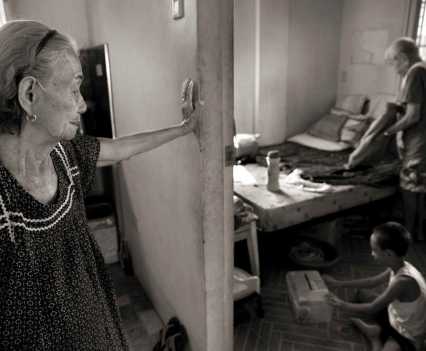
Lola Narcisa Claveria, 87, left, watches husband Aniceto Claveria and great grandson Joseph Tena, 8, wake up from an afternoon nap at their home in Antipolo, Metro Manila on Friday, May 10, 2019. Claveria was 12 years old in 1943 when the Japanese came to their village in Abra, Philippines, during World War II. Through a series of miscommunications, her father was accused of harboring guerrilla fighters and was skinned alive “like a water buffalo,” said Claveria. “By the time I got upstairs, I saw my mother on the floor with her skirt up, and the soldier named Soga was mounting her. My two younger siblings ran to protect her, and they threw them in the air and bayoneted them. As the soldiers dragged her and her two sisters away from their house, she could hear her father scream, “Children, where are you? I’m in such pain.” The girls were taken to a nearby garrison where for two years they served as sex slaves. Claveria’s aunt and her older sister living in Manila also served as “comfort women.” If they resisted, they would be horse whipped or burned with cigarettes. Claveria’s sister eventually lost her mind and Claveria would later care for her until her death. Her other sister disappeared and likely did not survive. In one family, four girls, their mother and an aunt were were subjected to sexual violence. She attributes her own survival and eventual mental healing to her husband who also had two sisters sexually enslaved during the war, though neither survived. “I am not repulsed by you,” he said. He would encourage her to tell her story and to fight, so she could be happy again. “And this made me stronger,” she said. The couple live with other family members and are raising their great grandson. Photo by Cheryl Diaz Meyer
Throughout Asia in Japanese occupied territories, some 200,000 girls and women — 80 percent were between the ages of 14 and 18, and some as young as eight — were sexually enslaved and victimized through abduction, coercion or deception by th
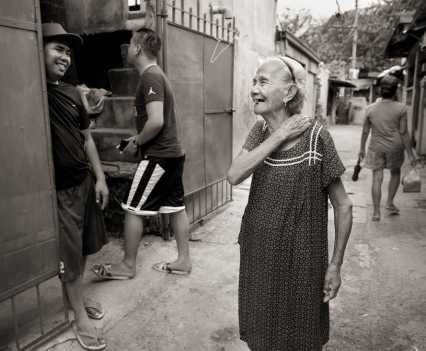
Lola Narcisa Claveria, 87, takes a moment to laugh with neighbors as she scours the area for her 8-year-old grandson in Antipolo, Metro Manila on May 29, 2019. Claveria was 12 years old in 1943 when the Japanese came to their village in Abra, Philippines, during World War II. Through a series of miscommunications, her father was accused of harboring guerrilla fighters and was skinned alive “like a water buffalo,” said Claveria. “By the time I got upstairs, I saw my mother on the floor with her skirt up, and the soldier named Soga was mounting her. My two younger siblings ran to protect her, and they threw them in the air and bayoneted them. As the soldiers dragged her and her two sisters away from their house, she could hear her father scream, “Children, where are you? I’m in such pain.” The girls were taken to a nearby garrison where for two years they served as sex slaves. Claveria’s aunt and her older sister living in Manila also served as “comfort women.” If they resisted, they would be horse whipped or burned with cigarettes. Claveria’s sister eventually lost her mind and Claveria would later care for her until her death. Her other sister disappeared and likely did not survive. In one family, four girls, their mother and an aunt were were subjected to sexual violence. She attributes her own survival and eventual mental healing to her husband who also had two sisters sexually enslaved during the war, though neither survived. “I am not repulsed by you,” he said. He would encourage her to tell her story and to fight, so she could be happy again. “And this made me stronger,” she said. The couple live with other family members and are raising their great grandson. Photo by Cheryl Diaz Meyer
Throughout Asia in Japanese occupied territories, some 200,000 girls and women — 80 percent were between the ages of 14 and 18, and some as young as eight — were sexually enslaved and victimized through abduction, coercion or deception by the Japanese Imperial Army during World War II. An estimated 1,000 girls and women served as “comfort women” in the Philippines. Three-fourths of the women were killed or died of injuries, illness and experimentation. Survivors suffered from post traumatic stress disorder, psychological ailments and sexually transmitted diseases. After the war, few women continued their education and consequently lived lives of economic disadvantage. Most eventually married but were commonly subjected to abuse from their husbands and often lived as societal outcasts.
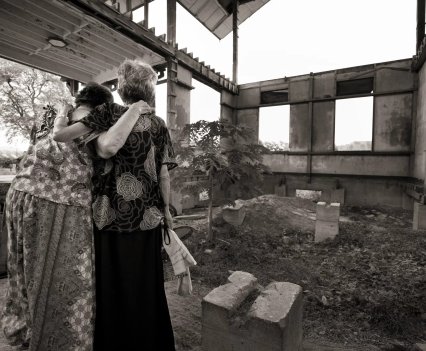
Lolas Pilar Galang and Belen Alarcon Culala, left and right, support each other as they walk through the Bahay na Pula, also known as the Red House. The women were children when their village of Mapaniqui in Pampanga, Philippines was attacked by the Japanese Imperial Army. All the men and boys were killed and the women and girls were forced to walk to the Bahay na Pula, also known as the Red House, carrying the loot that the Japanese soldiers stole from them. The once regal mansion owned by a Filipino doctor was used as a garrison and “comfort station” where the women and girls, some as young as eight, were systematically raped all night. Photo taken on Sunday, May 19, 2019.


















